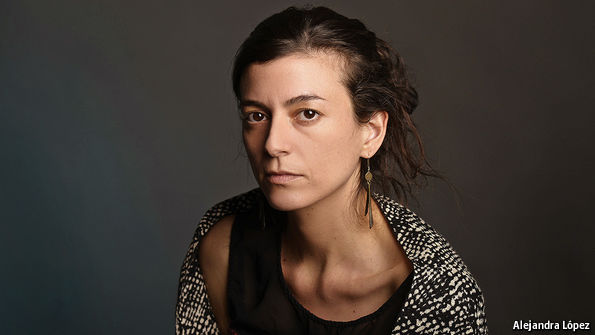Samanta Schweblin’s blistering debut novel
“Fever Dream” is suspenseful eco-horror
Fever Dream. By Samanta Schweblin. Translated by Megan McDowell. Riverhead Books; 192 pages; $25. Oneworld; £12.99.
THIS small debut novel packs a mighty, and lingering, punch. In “Fever Dream” Samanta Schweblin (pictured), an Argentinian short-story writer based in Berlin, wraps contemporary nightmares, both private and public, into a compact, but explosive, package. Ms Schweblin delivers a skin-prickling masterclass in dread and suspense. Sentence by sinister sentence, she instils and then intensifies “a terrifying feeling of doom”.
In rural Argentina, a frightened holidaymaker named Amanda lies dying in a clinic. David, the son of a local woman called Carla, interrogates the delirious patient about the events that have led her into this place of “danger and madness”. Amanda, in turn, recounts conversations with Carla that reveal, in fragments, a terrible tale. And what has become of Nina, Amanda’s daughter, whom her mother so fearfully kept within “rescue distance”? Convulsed by doubt and pain, she torments herself: “Was I a bad mother? Is it something I caused?”
In whispered snatches, the reader is told of poisonings and contaminations, of children hideously harmed, a blighted community and “something small and invisible that has ruined everything”. Around this double dialogue, perspectives shift and blur. Reality shimmers like the summer haze over the chemically enhanced green of the surrounding soya fields. No “rescue distance”, the reader learns, can ever be small enough for safety. As David says (or, perhaps, as Amanda hallucinates him saying): “Whatever has cursed this town for the past ten years is now inside me.”
With virtuoso skill, well served in Megan McDowell’s finely textured translation, Ms Schweblin fuses a study in maternal anxiety with an ecological horror story. She refracts both strands through the eerie prism of her narrative, almost as if Henry James had scripted a disaster movie about toxic agribusiness. The author has linked her “motionless scourge” to the pesticide-blasted prairies of Argentina. And then there is the abyss of a mother’s anguish. “My head”, Carla recalls, “was a tangled mess of guilt and terror.” As Ms Schweblin lands her punch, so will the reader’s be.
On April 20th, “Fever Dream” was shortlisted for the 2017 Man Booker International Prize. The winner will be announced on June 14th.
THIS small debut novel packs a mighty, and lingering, punch. In “Fever Dream” Samanta Schweblin (pictured), an Argentinian short-story writer based in Berlin, wraps contemporary nightmares, both private and public, into a compact, but explosive, package. Ms Schweblin delivers a skin-prickling masterclass in dread and suspense. Sentence by sinister sentence, she instils and then intensifies “a terrifying feeling of doom”.
Latest updates
With virtuoso skill, well served in Megan McDowell’s finely textured translation, Ms Schweblin fuses a study in maternal anxiety with an ecological horror story. She refracts both strands through the eerie prism of her narrative, almost as if Henry James had scripted a disaster movie about toxic agribusiness. The author has linked her “motionless scourge” to the pesticide-blasted prairies of Argentina. And then there is the abyss of a mother’s anguish. “My head”, Carla recalls, “was a tangled mess of guilt and terror.” As Ms Schweblin lands her punch, so will the reader’s be.
On April 20th, “Fever Dream” was shortlisted for the 2017 Man Booker International Prize. The winner will be announced on June 14th.

No comments:
Post a Comment